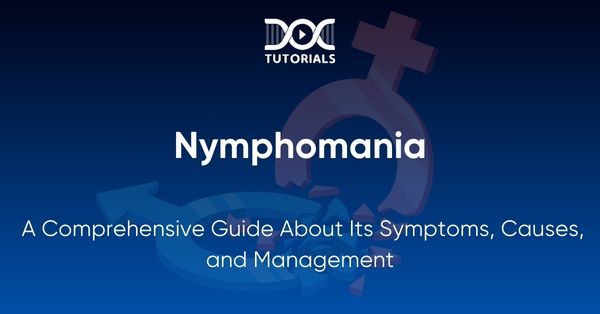Nymphomania: A Comprehensive Guide About Its Symptoms, Causes, and Management

According to a 2021 study in the United States, nymphomania disease is prevalent in approximately 3-6% of the population. It is a psychological condition that is characterised by uncontrolled sexual urges in females.
If not addressed at the right time, this condition can lead to various complications in an individual’s life, ruining their career, personal life, and social status. People should learn about such complex psychological conditions as they are a severe social concern.
The proper knowledge of such topics can help you identify the issues and help your loved ones. Moreover, if you are an MBBS student, a detailed insight into nymphomania is essential to cover your syllabus.
Here’s a complete overview of the symptoms, causes, treatment, and management of nymphomania disorder!
What is Nymphomania?
Nymphomania is a compulsive sexual behaviour, especially in females and homosexual men. It is a mental disorder in which one repeatedly gets engaged in sexual activities without even getting any sort of pleasure. Besides, the person cannot control this compulsive behaviour, which may lead to promiscuity.
Though the term “nymphomaniac” is used for women, this condition can happen to anyone. Some doctors consider it a mental illness, though the fact is not proven yet. However, this condition is a serious illness as it leads to problematic thinking, shame, obsession, etc.
What Causes Nymphomania?
Medical science has not yet discovered the cause of nymphomania, as the behaviour is completely unique. However, according to the research, the following factors may influence such compulsive sexual behaviour:
- Sexual abuse or any other trauma
- Excessive stress in life
- Parkinson’s disease
- Imbalanced neurotransmitters (brain chemicals)
- Triggering environmental factors, etc.
According to some experts, nymphomaniac behaviour is linked to traits like poor judgment and impulsivity. It often co-occurs with mental health conditions, such as bipolar disorder, where manic episodes can lead to risky sexual behaviours.
What are the Symptoms of Nymphomania?
Here are some of the nymphomania symptoms that you must know:
- Frequent urge to have sex which may release tension afterwards, but the person regrets or feels guilty.
- Using compulsive sexual behaviour or nymphomania as an escape from depression, loneliness, anxiety, or any other mental health-related issues.
- Intense fantasies and urge to have sexual indulgences repeatedly, which is going beyond control.
- Engaging in sexual behaviours despite causing problems like sexually transmitted infections (STIs), relationship loss, work issues, financial troubles, or legal concerns.
Mention the Risk Factors of Nymphomania
Here are some of the risk factors that may lead to nymphomania disorder but do not apply to all:
- If your gender is female
- Individuals with a family past of mental disorders
- If your age is below 30 years
- Individuals with a homosexual orientation
- Any recent trauma in life
- If you have any history of mental disorders
How to Diagnose Nymphomania Disease?
Previously, doctors used to identify nymphomania by observing a patient’s behaviour. However, now the healthcare providers discuss the past and present experiences of an individual regarding their:
- Fantasies in sexual activities
- Sexual urges and behaviour
- The consequences and impact of an individual’s compulsive sexual behaviour
Moreover, the doctors will also ask about the following to get a clear idea of what is triggering such behaviour in a person:
- Family past
- Medical history
- Psychological history
Apart from this, doctors now use advanced tools like the Hypersexual Disorder Screening Inventory to identify compulsive sexual behaviour in a person.
What are the Different Types of Behaviours in Nymphomania?
Nymphomania disease can lead to the following behaviours:
- Voyeurism
It can lead to criminal charges for harassment, as it involves intrusive actions like watching others without consent.
- Pornography
This addiction can consume significant time and resources, often involving extensive use of adult magazines, movies, and websites. The internet has exacerbated this issue by providing easy access to pornographic content and virtual sex platforms, where individuals can engage in sexual activities without physical contact.
- Masturbation
While it is a natural behaviour, it can become harmful when it’s used excessively as a substitute for intimacy or leads to feelings of inadequacy.
Some individuals may also become fixated on paid sex, constantly seeking new partners. These behaviours can lead to financial, legal, and relationship problems, highlighting the need for support and treatment.
What are the Treatment Methods for Nymphomania?
Nymphomania disorder can be treated through the following methods:
- Psychoeducation
This is a therapy that helps individuals understand compulsive sexual behaviour and reduce the stigma and shame associated with it. Allowing them an open conversation in a non-judgemental and safe setting helps them understand the differences between healthy and unhealthy sexual behaviour.
- Family or Couple Therapy
Doctors can suggest couples or family therapy over individual therapy. This can enhance communication, improve relationships, and deepen intimacy, providing a supportive environment for healing and growth.
- Medication
Doctors may prescribe medication to control compulsiveness in sexual behaviour or improve the mental health of a person diagnosed with nymphomania. For example, medicines like antidepressants or anti-anxiety can enhance one’s mental stability, further controlling such compulsive behaviour.
- CBT or Cognitive Behavioural Therapy
In this method, the therapist tries to identify the patients’ thinking patterns and triggers and understand their coping skills with the behaviour. They also help the patient make lifestyle changes that can support healthy sexual behaviour.
When Should One Consult a Doctor?
If an individual’s sexual behaviour feels out of control or causes distress, it’s time to seek medical help. Here are some of the indications that you need medical aid immediately:
- Certain behaviours that put you or others at risk.
- Actions or behaviours disrupting your work life.
- Behaviours that are affecting your personal relationships or are hidden from others.
- If one finds themselves concealing these actions, or such activities are impacting their well-being as well as that of others.
Additionally, professional guidance is crucial if the behaviour becomes increasingly extreme over time. Early intervention can lead to healthier outcomes.
How to Control Nymphomania?
Apart from therapy and medical treatment, one can try the following methods to manage the symptoms of nymphomania on their own:
- Engaging in social activities that make you happy
- Following a minimum 8-hour sleep routine
- Eating a healthy and balanced diet
- Seeking help from a nymphomania support group
- Doing exercise and workouts regularly
- Sharing your problems with a friend and family member, seeking their help, etc.
What are the Complications of Nymphomania?
Nymphomania can lead to the following complications for the patient as well as others:
- Development of mental conditions like severe anxiety, distress, and depression that may even lead to suicidal thoughts and attempt
- Spending money on telephone or internet sex, pornography, and other sexual services etc. can drain your finances
- Neglecting your family or lying to your partner which can destroy your personal life and relationships
- Struggling with shame or guilt that can lower your self-esteem
- Increased risk of contracting or transmitting sexually transmitted infections like HIV or hepatitis
- It might cause distractions, such as losing focus or accessing internet pornography, which can risk job security
- Compulsive sexual behaviour often co-occurs with substance abuse issues, such as excessive alcohol consumption or recreational drug use
- Uncontrolled sexual behaviour can make one commit sexual offences and get into legal trouble
FAQs About Nymphomania
- Can nymphomania be life-threatening?
Untreated nymphomania or compulsive desires can escalate into life-threatening symptoms, including self-harm, irrational behaviour, and dependency on others for basic care.
- Are there any complementary treatments for nymphomania?
Complementary treatments for nymphomania include acupuncture, massage therapy, nutritional supplements, herbal remedies, and yoga. These alternative therapies support traditional care but should not replace it; consult a doctor to avoid interactions with prescribed treatments.
- Are nymphomania and hypersexuality the same?
Nymphomania and hypersexuality are often confused, but they differ in scope. Nymphomania traditionally refers specifically to women, while hypersexuality is gender-neutral and emphasises the compulsive aspect of the behaviour.
- Is childhood experience related to nymphomania?
Childhood trauma, such as abuse or neglect, can lead to unhealthy sexual behaviours in adulthood, as individuals may use these behaviours as a way to cope with unresolved emotional pain.
- Is nymphomania caused due to biological or hormonal disorders?
Hormonal imbalances, particularly elevated testosterone levels, can increase sexual desire and potentially contribute to the development of nymphomania by intensifying sexual urges.
Conclusion
Nymphomania disease is a complex condition marked by compulsive sexual behaviour, often linked to psychological trauma and hormonal imbalances. It is essential to understand the causes and symptoms of this condition to adopt the proper treatment method.
For medical aspirants seeking comprehensive insights and professional guidance in this regard, DocTutorials offers valuable resources and expert-led discussions to help them gain a deeper understanding of the topic. As a medical student, you can enrol in our courses, such as the MBBS curriculum, NEET PG, etc., and access engaging live sessions, simplified conceptual notes, and cutting-edge training tools. Our courses are designed to provide you with a deeper understanding of all medical topics.
Latest Blogs
-

NEET PG Exam 2025- Date, Pattern, Marking Scheme, Subject Wise Weightage, and Exam Mode
NEET PG Exam 2025 is the ultimate gateway for medical graduates aspiring to pursue postgraduate courses in medicine, including MD,…
-

INI CET Exam 2025: Your Roadmap to Success – Key Topics, Strategies, and Lessons from Last Year’s Papers
The INI CET exam is more than just a test; it’s a significant milestone for many medical students aiming to…
-

INI CET Exam Success: Previous Year Question Papers & Ultimate Guide – INI CET PYQ
One can feel overwhelmed while preparing for the INI CET (Institute of National Importance Combined Entrance Test). A vast syllabus,…




